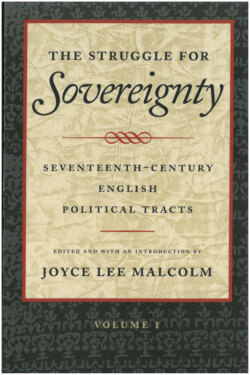Читать книгу The Struggle for Sovereignty - Группа авторов - Страница 26
На сайте Литреса книга снята с продажи.
ОглавлениеPeter Heylyn was an Oxford-trained clergyman. From the late 1620s he devoted his talents to promoting divine right monarchy and attacking Puritan beliefs. His efforts quickly brought him to the attention of William Laud and won him a variety of posts. In 1633 he assisted the Court in its case against the pugnacious and outspoken Presbyterian William Prynne. Three years later he obliged the king by writing a history of the sabbath that attacked Puritan scruples. And in 1640 Heylyn was credited with persuading the Convocation of the Church of England to endorse seventeen new canons that specifically asserted the divine right of kings.
With the outbreak of civil war Heylyn escaped to Oxford, where he was employed as editor of the royalist newspaper Mercurius Aulicus. He would live to serve as subdean at Westminster at the coronation of Charles II. Heylyn was described by contemporaries as an acrimonious controversialist, “a bluster-master,” “very conceited and pragmatical.”
Heylyn’s pen was at the service of the Crown and episcopal establishment in “Briefe and Moderate Answer,” a not-so-brief tract of some 194 pages published in 1637. It appeared in a single edition. His purpose was to challenge the religious and political beliefs of the Puritan Henry Burton, a man as outspoken as Heylyn himself. From his London pulpit Burton is said to have conducted “aggressive warfare” against episcopal practices. He was just as insistent that there must be limitations on royal power.
Undeterred by a citation in 1626 for his attack on Archbishop Laud, or by his imprisonment in 1629 for attacking bishops in “Babel no Bethel,” Burton denounced bishops again in November 1636, this time in two sermons published under the title “For God and the King.” He was hauled before the Star Chamber the following year for seditious libel and, along with two other prominent dissenters, Bastwick and Prynne, was brutally punished with deprivation, degradation, fine, pillory, the clipping of his ears, and imprisonment. The release of the three men was one of the first official acts of the Long Parliament.
Chapter two of Heylyn’s lengthy reply to Burton is reprinted here. This chapter is a response to Burton’s “For God and the King,” itself 166 pages long. Heylyn’s refutation does double duty as it provides the modern reader with a healthy dose of Burton’s arguments as well as a biting refutation of them by a vigorous proponent of divine right.
